T. Hill, Y. Ouedraogo and L. Conditamde
Tony Hill is Programme Support Director, TREE AID United Kingdom Office, Bristol, United Kingdom.
Yacouba Ouedraogo is Programme Coordinator, and Ludovic Conditamde is Projects Officer, TREE AID West Africa Office, Ouagadougou, Burkina Faso.
A review of outcomes, two years into an initiative to build the capacity of poor rural households in Burkina Faso to generate income from tree products.
Non-wood forest products (NWFPs) are an important part of traditional livelihoods and culture in the West African Sahel and remain popular not only with rural people, but also with recently urbanized populations. Villagers generally have free access to communal forest resources. NWFPs are already an important source of income for rural households – especially for women, as NWFP harvesting and marketing is a traditional preserve of women in Africa. Although official statistics are rare, informal evidence indicates that trade in NWFPs has grown in recent years, both domestically and internationally.
Yet isolation from marketing opportunities remains a familiar characteristic of rural livelihoods in the Sahel. TREE AID, a non-governmental organization (NGO) based in the United Kingdom, has developed a series of initiatives to help rural populations in the region take fuller advantage of opportunities for commercial trade in tree and forest products. This article focuses on the Village Tree Enterprise project in Burkina Faso.
| Selling dried baobab leaves and other forest-derived condiments in Fada market, Burkina Faso |
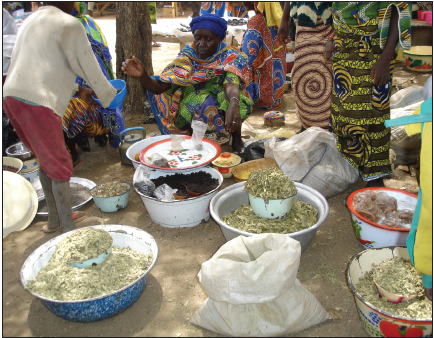 |
TREE AID |
In January 2005, various departments of the Burkina Faso Government, local NGOs, TREE AID and FAO joined forces to launch a pilot project for the promotion of small business development based on tree and forest products: Village Tree Enterprise. The pilot project adopted a Market Analysis and Development (MA&D) approach (see Box p. 34) to entrepreneurial organization and capacity building at the village level to improve local processing and marketing of NWFPs. A baseline survey carried out at the project’s start showed that 13 percent of total household income in the project area came from tree products.
To ensure the project’s policy impact and the replicability and sustainability of support for village tree enterprises, the project brought together NGO and government field staff; they were trained side by side in the MA&D approach and paired up in the field to implement the approach at village level.
Initially the project began work in 29 villages in eight sites in Burkina Faso, plus another six villages just over the border in Mali. In April 2005 TREE AID secured a grant to continue this work and expand it over five years to cover 50 villages in Burkina Faso and 20 in Mali. Additional funding obtained through the European Commission’s Tropical Forests Programme has made it possible to expand the initiative further in both countries. A parallel initiative was created in northern Ghana in late 2006. The Village Tree Enterprise initiative will soon be running in 172 villages at 17 sites (Figure 1 ).
| 1 Village Tree Enterprise project sites |
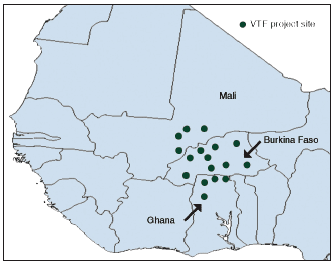 |
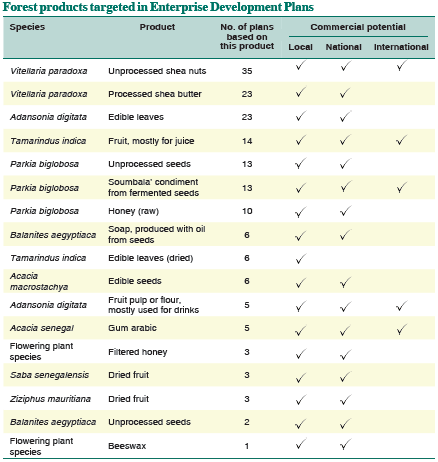 |
The MA&D process has been completed in 28 villages in Burkina Faso. By the end of the first phase, villagers had come up with a short list of 41 tree products with marketing potential. By the end of the process 164 tree product interest groups had emerged, with a total membership of 1 735. Each of these groups has produced an Enterprise Development Plan. In all, the plans are based on 17 different NWFPs derived from nine tree species plus various flowering plant species (Table). The aggregated income forecast in the 164 Enterprise Development Plans is more than US$1.5 million. While it is important to stress that this figure represents potential turnover rather than realized profit, it is indicative of the relative value of NWFP markets to households with an average annual income of around US$1 000.
Support needs identified in the Enterprise Development Plans include the following.
| 2 Identified needs for technical training |
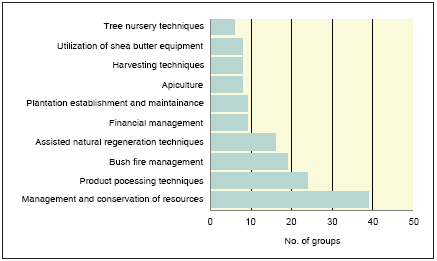 |
The first participating villages took about 18 months to produce their draft plans and another six months to finalize them. The process was slowed by the lack of experience among all stakeholders, the challenges of coordinating inputs of government agencies and NGOs, and seasonal unavailability of local people engaged in agricultural fieldwork.
The main technical difficulty faced by partner NGOs and villagers was in the assessment of NWFP harvesting rates that could be sustained without degrading the resource base. Another challenge was many participants’ expectation of direct material or financial assistance from donors, which other projects in the area had provided. In some project areas product targeting had to be revisited because the initial selection centred on the products’ perceived social value, rather than on its economic viability as a basis for enterprise development as emphasized by the MA&D approach. Another challenge was effective involvement of poorer households and women. Women wishing to establish fruit-tree orchards faced a particular problem, because under traditional tenure systems it is difficult for individual women to establish secure land tenure. However, groups of women were better able to negotiate with their village chiefs to secure access to land on which to plant orchards.
The progress to date suggests that the participatory and iterative nature of the MA&D approach is apt for supporting rural producers in addressing constraints and barriers to enterprise development based on the sustainable use of NWFPs. However, the approach is demanding of time and resources. Skilled facilitators, adequate investment in training (around six days for each of the three phases of the MA&D approach) and adequate field support and supervision are particularly important. As MA&D is not a quick approach, it should best be seen as an investment in long-term sustainability.
| Field training for Market Analysis and Development (MA&D) facilitators, Kogyende Village, Barsalogho, Burkina Faso |
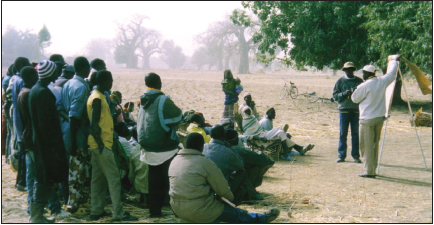 |
TREE AID |
The next immediate priorities for the Village Tree Enterprise initiative are to:
Recognizing that secure access to and control of forest resources for poor families will be critical if they are to benefit from NWFP development, TREE AID is embarking on a major five-year project (with funding from the United Kingdom Department of International Development [DFID]) to create a favourable policy environment and institutional framework for forest governance in Burkina Faso. Rather than policy change, the main concern is effective and participatory implementation of existing national policy for decentralized natural resource management and of the Forest Code. This project will work with new decentralized government structures and civil society organizations at the village or commune (township) level, government service providers and local NGO partners at the department (subprovincial) level, relevant government ministries at the national level, and forest governance learning groups in neighbouring Mali and Ghana.
In the medium term, TREE AID also plans to:
These plans will be taken forward in partnership with FAO and the International Institute for Environment and Development (IIED) through the Forest Connect initiative (see www.fao.org/forestry/site/42297).
Government trade policy has not surfaced as a critical issue yet, but potential emerging issues are official and unofficial barriers to regional trade, local taxation policies of recently established commune-level government, market access for imported tree product substitutes and regulation of international trade for major tree product exports such as shea nuts/butter and gum arabic.
The Village Tree Enterprise initiative is a work in progress, and many questions are still to be resolved. For example:
Yet the Village Tree Enterprise initiative has already helped rural communities analyse opportunities, structure enquiries and overcome immediate problems in accessing information, finance and services. It has also helped them to communicate with each other and recognize mutual interests. As such it represents a step towards creating viable enterprises that can help alleviate poverty.
What is Market Analysis and Development? Market Analysis and Development (MA&D) is a methodology developed by FAO and the Regional Community Forestry Training Center for Asia and the Pacific (RECOFTC) to assist local entrepreneurs in developing income-generating enterprises while conserving tree and forest resources. The approach has been especially developed for application in areas where literacy is low and access to markets limited. It enables poor rural households to assess potential returns and risks associated with different strategies for the development of enterprises based on tree and forest products.
MA&D is a framework that can be tailored to different contexts, purposes and products. Some countries where FAO has used this approach are Burkina Faso, Colombia, the Gambia, the Lao People’s Democratic Republic, Mali, Mongolia, Kyrgyzstan, Serbia and Uganda. MA&D materialsAn MA&D field manual, Community based tree and forest product enterprises: Market Analysis and Development (FAO, 2000) has been designed to guide field practitioners who will assist local people in conducting the MA&D process. It consists of six booklets and a map of the process.
|